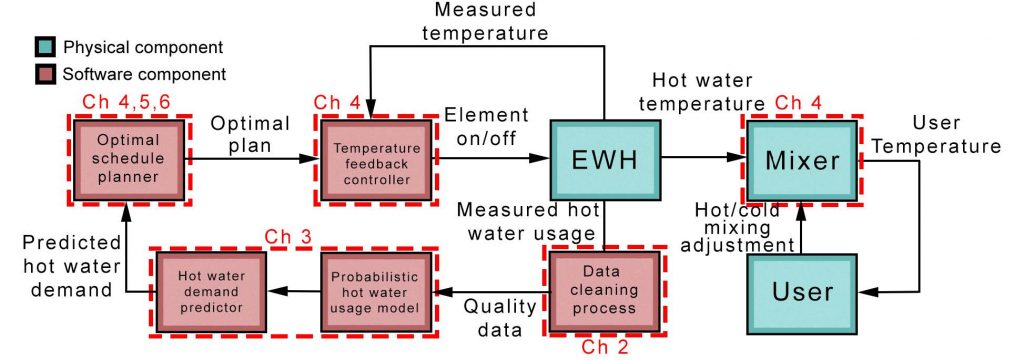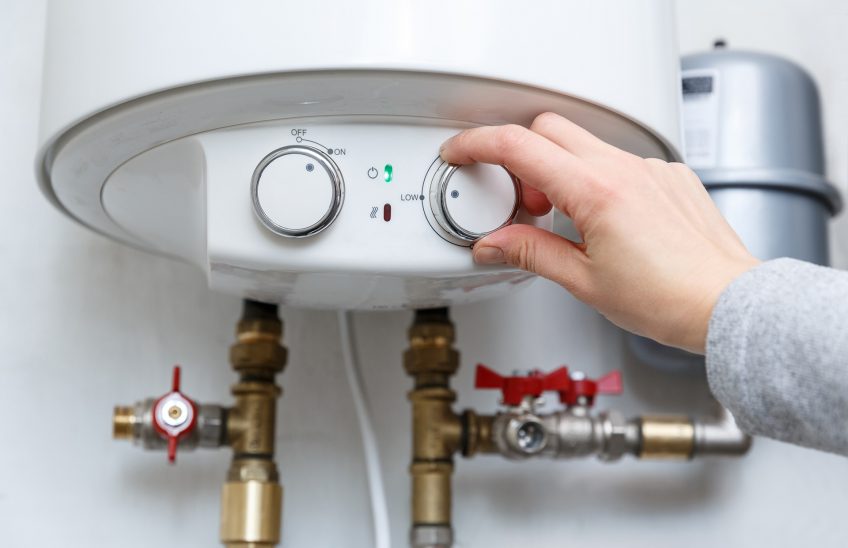It is estimated that South Africa uses 38.5GWh/day on water heating with water heating contributing up to 40% of a household’s total electricity usage. It places a considerable burden on the electricity grid due to high power ratings and users’ hot water usage. Tanked water heaters can store thermal energy for extended periods of time with a portion lost to the environment. Although many demand response strategies have been proposed to mitigate costs from time-of-use pricing of electricity, many developing countries have flat-rate pricing and are heavily reliant on the burning of fossil fuels for electricity. In the research discussed in this article, Dr Michael Ritchie, for his PhD under the supervision of Prof Thinus Booysen and Dr Japie Engelbrecht, explores optimisation to develop a system that provides electric water heaters (EWHs) with the optimal heating schedule to minimise overall electrical energy usage without compromising the comfort of the customer.

Background
The efficacy of energy management techniques that model water heaters and the accuracy of their simulation results rely on representative hot water usage profiles. In his dissertation, Dr Ritchie proposed a probabilistic data-driven model for modelling individualised hot water profiles and an accompanying hot water usage simulator. This model was trained and evaluated using high-quality data gathered from 77 residential households. The data were first refined through a data cleaning process. A hot water demand predictor was also developed on top of the probabilistic model to predict future hot water profiles that can be used for optimisation. A novel dynamic programming (DP) approach was presented to achieve optimal control of a single node EWH.
An A* search algorithm to achieve optimal control of an EWH
To accommodate the natural stratification that occurs, a novel A* search algorithm approach was presented that could achieve optimal control of an EWH with stratification. The DP and A* approaches produced the optimal plan for hot water usage profiles with perfect foreknowledge of water drawn from the EWH. The A* approach was further utilised to produce an optimal plan for the hot water usage profile when water drawn was predicted. All three conditions were tested with a simulator equipped with a novel temperature feedback controller to minimise the effects of mispredictions and model inaccuracies between the optimal planning and the execution, and a reactive water mixer to simulate the user behaviour.
Three strategies for optimal control of domestic water heating
Three strategies were explored for optimal control of domestic water heating that do not depend on the default thermostat control, namely: matching the delivery temperature in the hot water; matching the energy delivered in the hot water; and a variation of the second strategy which provides for Legionella sterilisation. For each of these strategies, the energy used in heating, the energy delivered at the tank outlet, and issues of convenience to the user were examined to determine how much energy an EWH can save. Notably, most energy savings were achieved when the energy matching strategy was used, where 21.9% was saved when water usages were perfectly known and 9.6 % was saved when they were predicted.
Going forward
In the future, this system could be implemented in a practical, real-world scenario and used by consumers to achieve actual energy savings. The probabilistic hot water usage model and EWH optimiser could be implemented as part of an SEC directly attached to the EWH. Sensor measurements could be locally measured to generate, and continuously improve the hot water usage model of the tank. By using both real-world and synthesised hot water usage profiles, we determined the absolute best energy savings, with the fewest cold events, which can be achieved with scheduling and temperature control while causing the minimum of inconvenience to the consumer.
Read the complete research paper: M Ritchie, Usage-based optimal energy control of residential water heaters, PhD dissertation, Stellenbosch University, 2021 https://scholar.sun.ac.za/handle/10019.1/123701





